Organizational Behaviour: Leadership and Power Relationships
VerifiedAdded on 2023/04/08
|8
|1831
|331
AI Summary
This paper discusses the concepts of organizational behaviour, supervisory behaviour, power relationships, and job performance. It explores the use of Experience Cube techniques for analyzing the organizational process. The paper emphasizes the importance of effective leadership and the impact of power on employees. It also highlights the role of emotional intelligence and emotional labor in organizational behavior.
Contribute Materials
Your contribution can guide someone’s learning journey. Share your
documents today.
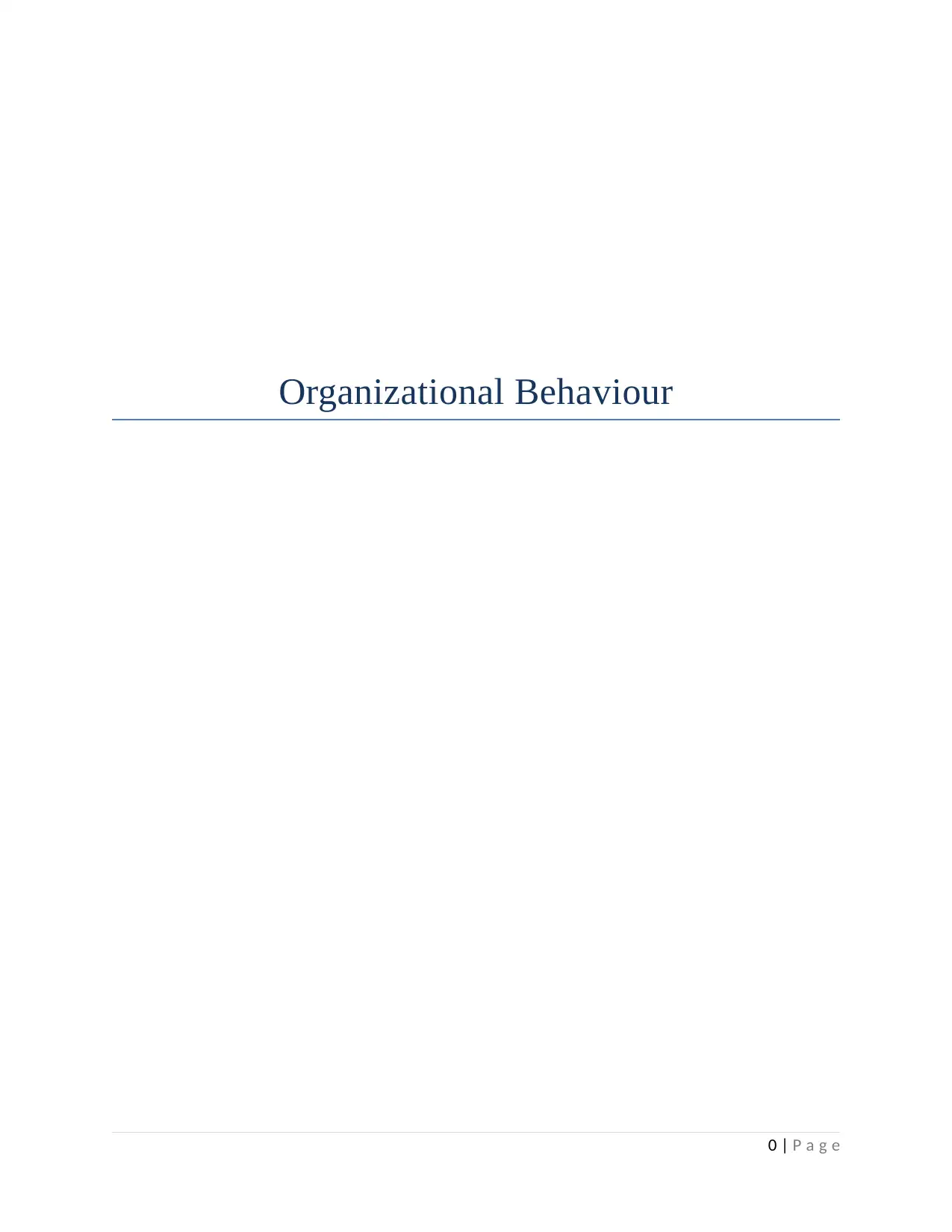
Organizational Behaviour
0 | P a g e
0 | P a g e
Secure Best Marks with AI Grader
Need help grading? Try our AI Grader for instant feedback on your assignments.
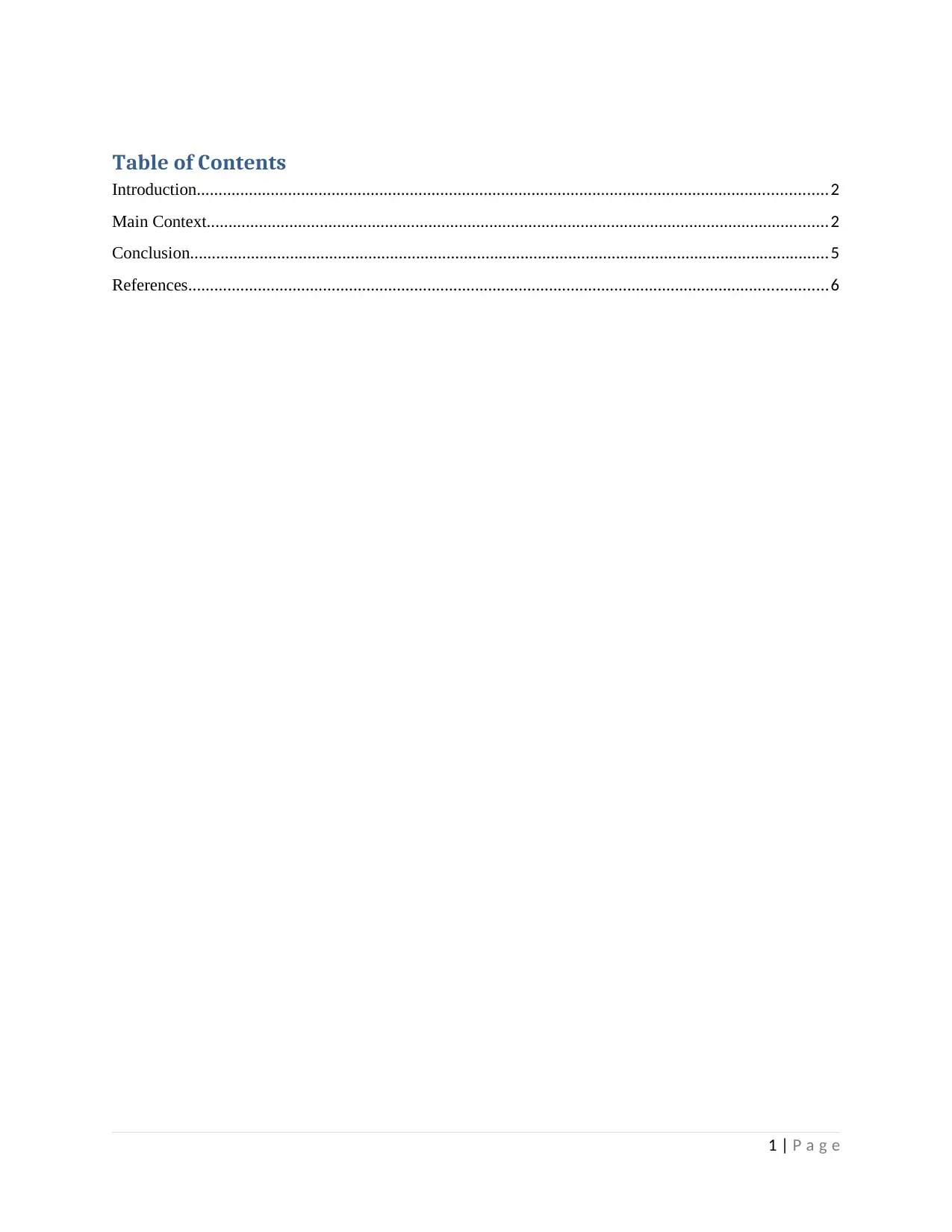
Table of Contents
Introduction.................................................................................................................................................2
Main Context...............................................................................................................................................2
Conclusion...................................................................................................................................................5
References...................................................................................................................................................6
1 | P a g e
Introduction.................................................................................................................................................2
Main Context...............................................................................................................................................2
Conclusion...................................................................................................................................................5
References...................................................................................................................................................6
1 | P a g e
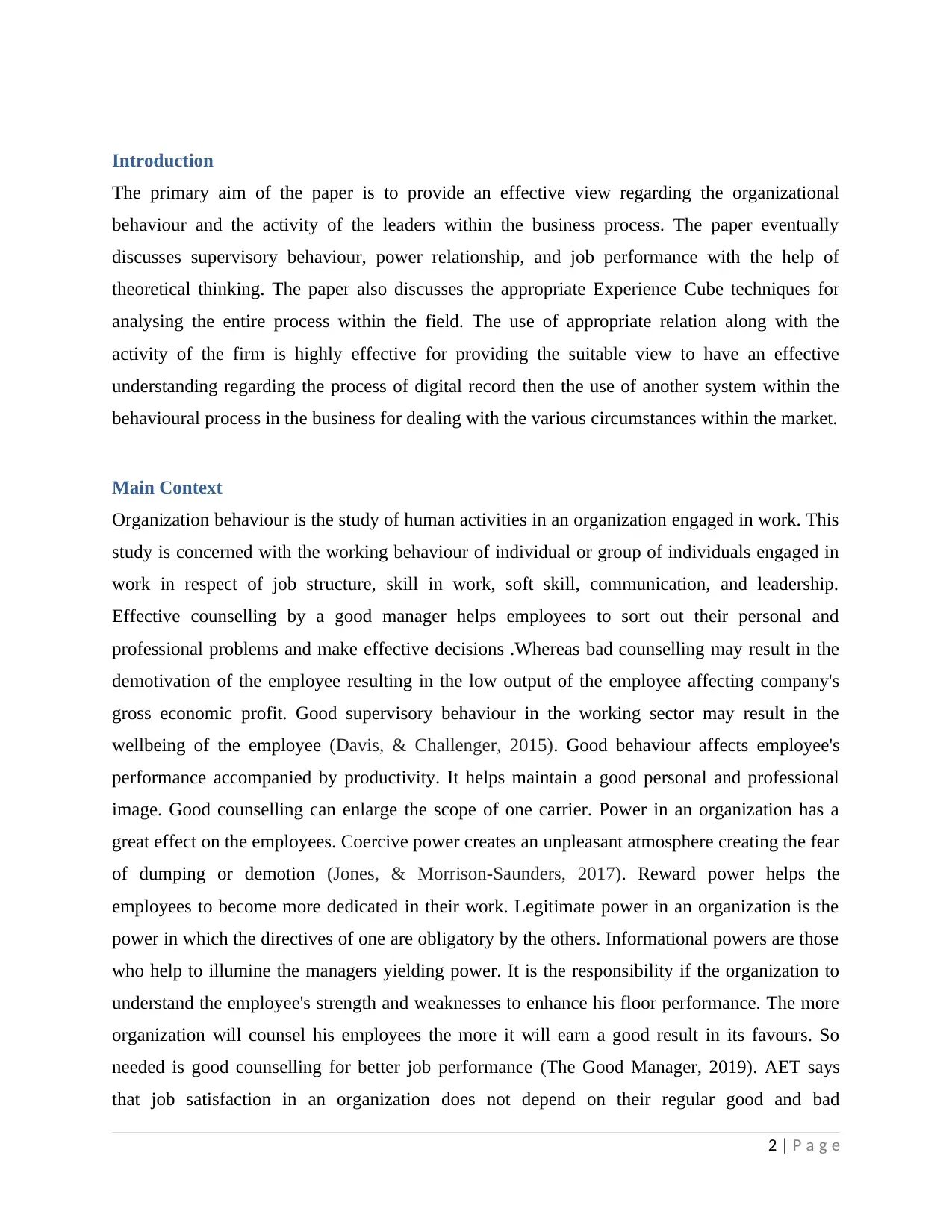
Introduction
The primary aim of the paper is to provide an effective view regarding the organizational
behaviour and the activity of the leaders within the business process. The paper eventually
discusses supervisory behaviour, power relationship, and job performance with the help of
theoretical thinking. The paper also discusses the appropriate Experience Cube techniques for
analysing the entire process within the field. The use of appropriate relation along with the
activity of the firm is highly effective for providing the suitable view to have an effective
understanding regarding the process of digital record then the use of another system within the
behavioural process in the business for dealing with the various circumstances within the market.
Main Context
Organization behaviour is the study of human activities in an organization engaged in work. This
study is concerned with the working behaviour of individual or group of individuals engaged in
work in respect of job structure, skill in work, soft skill, communication, and leadership.
Effective counselling by a good manager helps employees to sort out their personal and
professional problems and make effective decisions .Whereas bad counselling may result in the
demotivation of the employee resulting in the low output of the employee affecting company's
gross economic profit. Good supervisory behaviour in the working sector may result in the
wellbeing of the employee (Davis, & Challenger, 2015). Good behaviour affects employee's
performance accompanied by productivity. It helps maintain a good personal and professional
image. Good counselling can enlarge the scope of one carrier. Power in an organization has a
great effect on the employees. Coercive power creates an unpleasant atmosphere creating the fear
of dumping or demotion (Jones, & Morrison-Saunders, 2017). Reward power helps the
employees to become more dedicated in their work. Legitimate power in an organization is the
power in which the directives of one are obligatory by the others. Informational powers are those
who help to illumine the managers yielding power. It is the responsibility if the organization to
understand the employee's strength and weaknesses to enhance his floor performance. The more
organization will counsel his employees the more it will earn a good result in its favours. So
needed is good counselling for better job performance (The Good Manager, 2019). AET says
that job satisfaction in an organization does not depend on their regular good and bad
2 | P a g e
The primary aim of the paper is to provide an effective view regarding the organizational
behaviour and the activity of the leaders within the business process. The paper eventually
discusses supervisory behaviour, power relationship, and job performance with the help of
theoretical thinking. The paper also discusses the appropriate Experience Cube techniques for
analysing the entire process within the field. The use of appropriate relation along with the
activity of the firm is highly effective for providing the suitable view to have an effective
understanding regarding the process of digital record then the use of another system within the
behavioural process in the business for dealing with the various circumstances within the market.
Main Context
Organization behaviour is the study of human activities in an organization engaged in work. This
study is concerned with the working behaviour of individual or group of individuals engaged in
work in respect of job structure, skill in work, soft skill, communication, and leadership.
Effective counselling by a good manager helps employees to sort out their personal and
professional problems and make effective decisions .Whereas bad counselling may result in the
demotivation of the employee resulting in the low output of the employee affecting company's
gross economic profit. Good supervisory behaviour in the working sector may result in the
wellbeing of the employee (Davis, & Challenger, 2015). Good behaviour affects employee's
performance accompanied by productivity. It helps maintain a good personal and professional
image. Good counselling can enlarge the scope of one carrier. Power in an organization has a
great effect on the employees. Coercive power creates an unpleasant atmosphere creating the fear
of dumping or demotion (Jones, & Morrison-Saunders, 2017). Reward power helps the
employees to become more dedicated in their work. Legitimate power in an organization is the
power in which the directives of one are obligatory by the others. Informational powers are those
who help to illumine the managers yielding power. It is the responsibility if the organization to
understand the employee's strength and weaknesses to enhance his floor performance. The more
organization will counsel his employees the more it will earn a good result in its favours. So
needed is good counselling for better job performance (The Good Manager, 2019). AET says
that job satisfaction in an organization does not depend on their regular good and bad
2 | P a g e
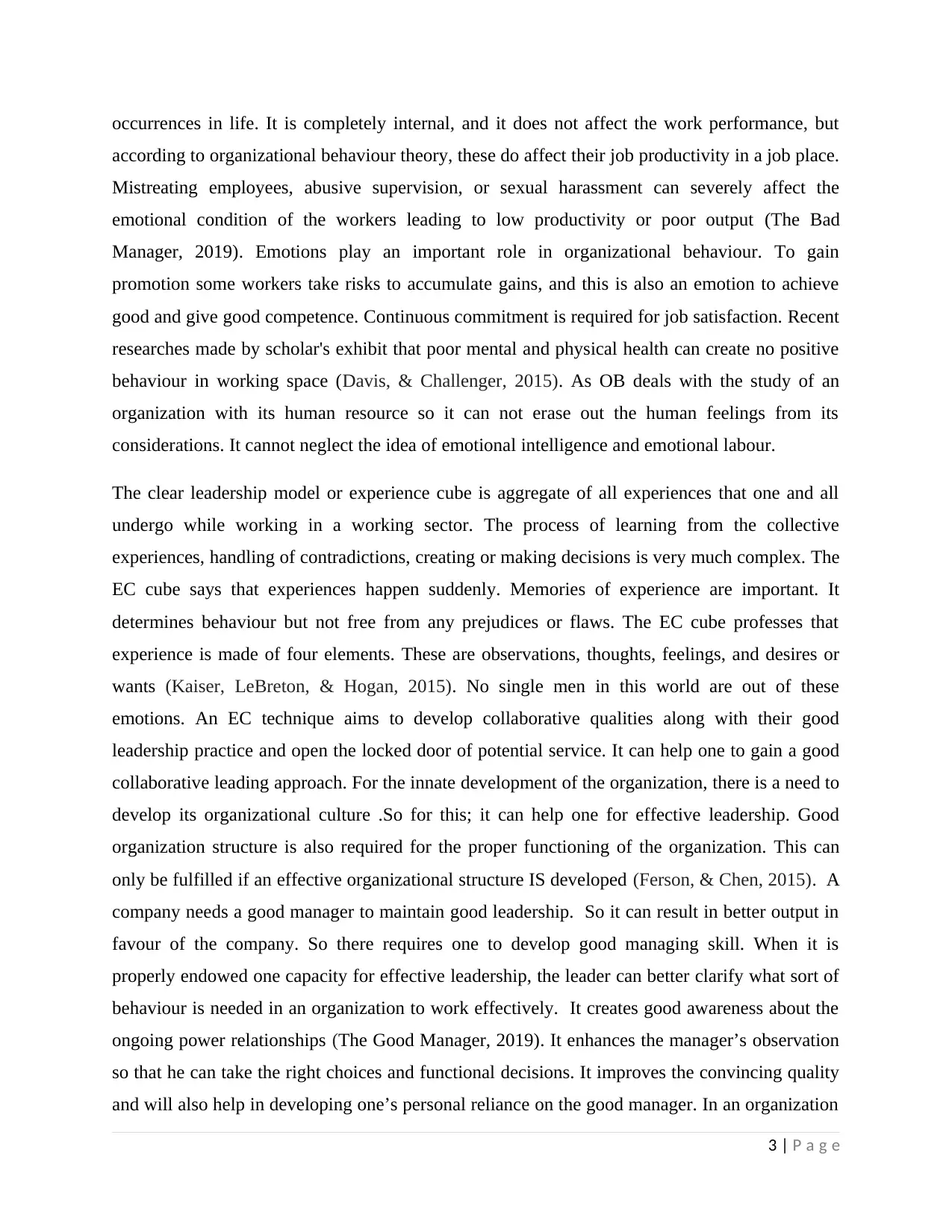
occurrences in life. It is completely internal, and it does not affect the work performance, but
according to organizational behaviour theory, these do affect their job productivity in a job place.
Mistreating employees, abusive supervision, or sexual harassment can severely affect the
emotional condition of the workers leading to low productivity or poor output (The Bad
Manager, 2019). Emotions play an important role in organizational behaviour. To gain
promotion some workers take risks to accumulate gains, and this is also an emotion to achieve
good and give good competence. Continuous commitment is required for job satisfaction. Recent
researches made by scholar's exhibit that poor mental and physical health can create no positive
behaviour in working space (Davis, & Challenger, 2015). As OB deals with the study of an
organization with its human resource so it can not erase out the human feelings from its
considerations. It cannot neglect the idea of emotional intelligence and emotional labour.
The clear leadership model or experience cube is aggregate of all experiences that one and all
undergo while working in a working sector. The process of learning from the collective
experiences, handling of contradictions, creating or making decisions is very much complex. The
EC cube says that experiences happen suddenly. Memories of experience are important. It
determines behaviour but not free from any prejudices or flaws. The EC cube professes that
experience is made of four elements. These are observations, thoughts, feelings, and desires or
wants (Kaiser, LeBreton, & Hogan, 2015). No single men in this world are out of these
emotions. An EC technique aims to develop collaborative qualities along with their good
leadership practice and open the locked door of potential service. It can help one to gain a good
collaborative leading approach. For the innate development of the organization, there is a need to
develop its organizational culture .So for this; it can help one for effective leadership. Good
organization structure is also required for the proper functioning of the organization. This can
only be fulfilled if an effective organizational structure IS developed (Ferson, & Chen, 2015). A
company needs a good manager to maintain good leadership. So it can result in better output in
favour of the company. So there requires one to develop good managing skill. When it is
properly endowed one capacity for effective leadership, the leader can better clarify what sort of
behaviour is needed in an organization to work effectively. It creates good awareness about the
ongoing power relationships (The Good Manager, 2019). It enhances the manager’s observation
so that he can take the right choices and functional decisions. It improves the convincing quality
and will also help in developing one’s personal reliance on the good manager. In an organization
3 | P a g e
according to organizational behaviour theory, these do affect their job productivity in a job place.
Mistreating employees, abusive supervision, or sexual harassment can severely affect the
emotional condition of the workers leading to low productivity or poor output (The Bad
Manager, 2019). Emotions play an important role in organizational behaviour. To gain
promotion some workers take risks to accumulate gains, and this is also an emotion to achieve
good and give good competence. Continuous commitment is required for job satisfaction. Recent
researches made by scholar's exhibit that poor mental and physical health can create no positive
behaviour in working space (Davis, & Challenger, 2015). As OB deals with the study of an
organization with its human resource so it can not erase out the human feelings from its
considerations. It cannot neglect the idea of emotional intelligence and emotional labour.
The clear leadership model or experience cube is aggregate of all experiences that one and all
undergo while working in a working sector. The process of learning from the collective
experiences, handling of contradictions, creating or making decisions is very much complex. The
EC cube says that experiences happen suddenly. Memories of experience are important. It
determines behaviour but not free from any prejudices or flaws. The EC cube professes that
experience is made of four elements. These are observations, thoughts, feelings, and desires or
wants (Kaiser, LeBreton, & Hogan, 2015). No single men in this world are out of these
emotions. An EC technique aims to develop collaborative qualities along with their good
leadership practice and open the locked door of potential service. It can help one to gain a good
collaborative leading approach. For the innate development of the organization, there is a need to
develop its organizational culture .So for this; it can help one for effective leadership. Good
organization structure is also required for the proper functioning of the organization. This can
only be fulfilled if an effective organizational structure IS developed (Ferson, & Chen, 2015). A
company needs a good manager to maintain good leadership. So it can result in better output in
favour of the company. So there requires one to develop good managing skill. When it is
properly endowed one capacity for effective leadership, the leader can better clarify what sort of
behaviour is needed in an organization to work effectively. It creates good awareness about the
ongoing power relationships (The Good Manager, 2019). It enhances the manager’s observation
so that he can take the right choices and functional decisions. It improves the convincing quality
and will also help in developing one’s personal reliance on the good manager. In an organization
3 | P a g e
Secure Best Marks with AI Grader
Need help grading? Try our AI Grader for instant feedback on your assignments.
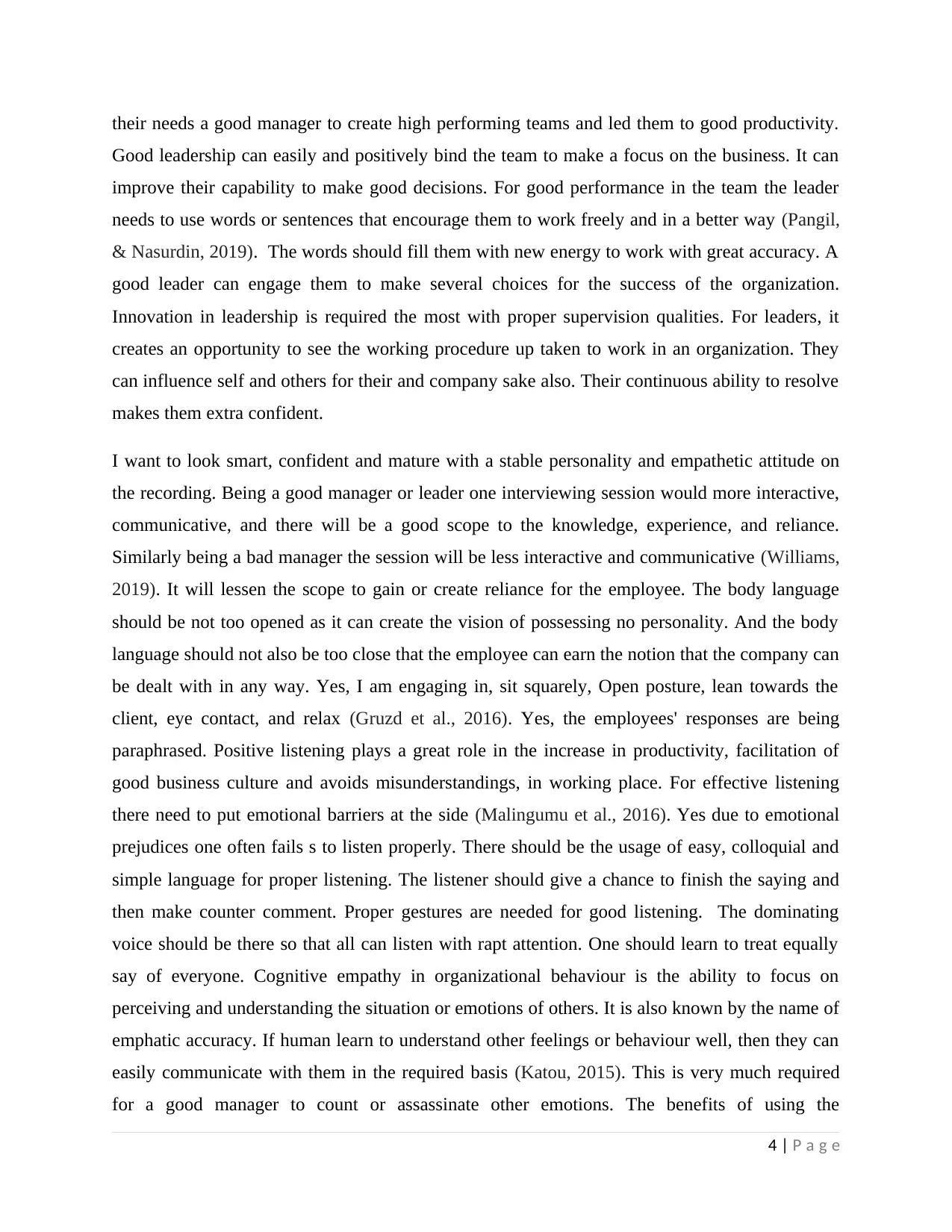
their needs a good manager to create high performing teams and led them to good productivity.
Good leadership can easily and positively bind the team to make a focus on the business. It can
improve their capability to make good decisions. For good performance in the team the leader
needs to use words or sentences that encourage them to work freely and in a better way (Pangil,
& Nasurdin, 2019). The words should fill them with new energy to work with great accuracy. A
good leader can engage them to make several choices for the success of the organization.
Innovation in leadership is required the most with proper supervision qualities. For leaders, it
creates an opportunity to see the working procedure up taken to work in an organization. They
can influence self and others for their and company sake also. Their continuous ability to resolve
makes them extra confident.
I want to look smart, confident and mature with a stable personality and empathetic attitude on
the recording. Being a good manager or leader one interviewing session would more interactive,
communicative, and there will be a good scope to the knowledge, experience, and reliance.
Similarly being a bad manager the session will be less interactive and communicative (Williams,
2019). It will lessen the scope to gain or create reliance for the employee. The body language
should be not too opened as it can create the vision of possessing no personality. And the body
language should not also be too close that the employee can earn the notion that the company can
be dealt with in any way. Yes, I am engaging in, sit squarely, Open posture, lean towards the
client, eye contact, and relax (Gruzd et al., 2016). Yes, the employees' responses are being
paraphrased. Positive listening plays a great role in the increase in productivity, facilitation of
good business culture and avoids misunderstandings, in working place. For effective listening
there need to put emotional barriers at the side (Malingumu et al., 2016). Yes due to emotional
prejudices one often fails s to listen properly. There should be the usage of easy, colloquial and
simple language for proper listening. The listener should give a chance to finish the saying and
then make counter comment. Proper gestures are needed for good listening. The dominating
voice should be there so that all can listen with rapt attention. One should learn to treat equally
say of everyone. Cognitive empathy in organizational behaviour is the ability to focus on
perceiving and understanding the situation or emotions of others. It is also known by the name of
emphatic accuracy. If human learn to understand other feelings or behaviour well, then they can
easily communicate with them in the required basis (Katou, 2015). This is very much required
for a good manager to count or assassinate other emotions. The benefits of using the
4 | P a g e
Good leadership can easily and positively bind the team to make a focus on the business. It can
improve their capability to make good decisions. For good performance in the team the leader
needs to use words or sentences that encourage them to work freely and in a better way (Pangil,
& Nasurdin, 2019). The words should fill them with new energy to work with great accuracy. A
good leader can engage them to make several choices for the success of the organization.
Innovation in leadership is required the most with proper supervision qualities. For leaders, it
creates an opportunity to see the working procedure up taken to work in an organization. They
can influence self and others for their and company sake also. Their continuous ability to resolve
makes them extra confident.
I want to look smart, confident and mature with a stable personality and empathetic attitude on
the recording. Being a good manager or leader one interviewing session would more interactive,
communicative, and there will be a good scope to the knowledge, experience, and reliance.
Similarly being a bad manager the session will be less interactive and communicative (Williams,
2019). It will lessen the scope to gain or create reliance for the employee. The body language
should be not too opened as it can create the vision of possessing no personality. And the body
language should not also be too close that the employee can earn the notion that the company can
be dealt with in any way. Yes, I am engaging in, sit squarely, Open posture, lean towards the
client, eye contact, and relax (Gruzd et al., 2016). Yes, the employees' responses are being
paraphrased. Positive listening plays a great role in the increase in productivity, facilitation of
good business culture and avoids misunderstandings, in working place. For effective listening
there need to put emotional barriers at the side (Malingumu et al., 2016). Yes due to emotional
prejudices one often fails s to listen properly. There should be the usage of easy, colloquial and
simple language for proper listening. The listener should give a chance to finish the saying and
then make counter comment. Proper gestures are needed for good listening. The dominating
voice should be there so that all can listen with rapt attention. One should learn to treat equally
say of everyone. Cognitive empathy in organizational behaviour is the ability to focus on
perceiving and understanding the situation or emotions of others. It is also known by the name of
emphatic accuracy. If human learn to understand other feelings or behaviour well, then they can
easily communicate with them in the required basis (Katou, 2015). This is very much required
for a good manager to count or assassinate other emotions. The benefits of using the
4 | P a g e
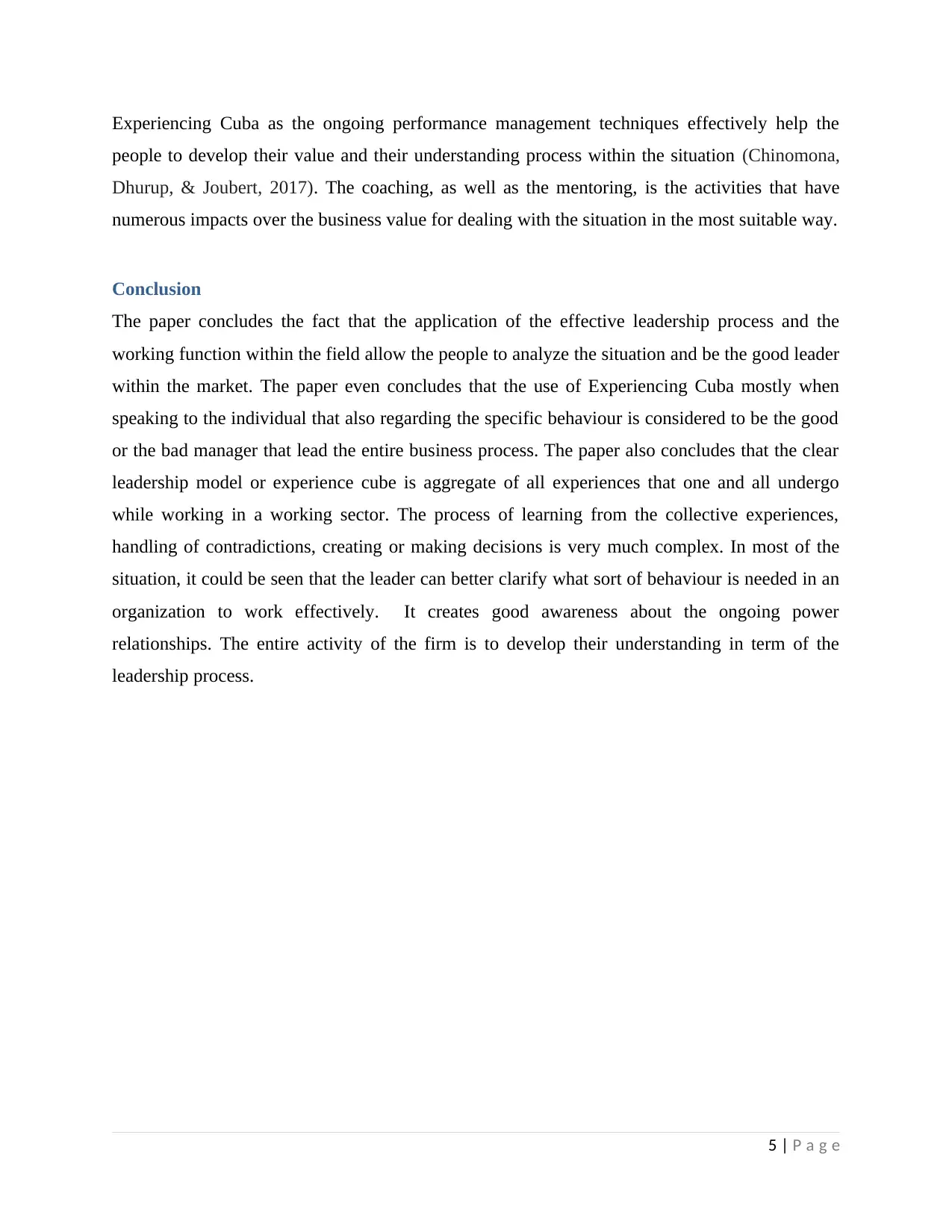
Experiencing Cuba as the ongoing performance management techniques effectively help the
people to develop their value and their understanding process within the situation (Chinomona,
Dhurup, & Joubert, 2017). The coaching, as well as the mentoring, is the activities that have
numerous impacts over the business value for dealing with the situation in the most suitable way.
Conclusion
The paper concludes the fact that the application of the effective leadership process and the
working function within the field allow the people to analyze the situation and be the good leader
within the market. The paper even concludes that the use of Experiencing Cuba mostly when
speaking to the individual that also regarding the specific behaviour is considered to be the good
or the bad manager that lead the entire business process. The paper also concludes that the clear
leadership model or experience cube is aggregate of all experiences that one and all undergo
while working in a working sector. The process of learning from the collective experiences,
handling of contradictions, creating or making decisions is very much complex. In most of the
situation, it could be seen that the leader can better clarify what sort of behaviour is needed in an
organization to work effectively. It creates good awareness about the ongoing power
relationships. The entire activity of the firm is to develop their understanding in term of the
leadership process.
5 | P a g e
people to develop their value and their understanding process within the situation (Chinomona,
Dhurup, & Joubert, 2017). The coaching, as well as the mentoring, is the activities that have
numerous impacts over the business value for dealing with the situation in the most suitable way.
Conclusion
The paper concludes the fact that the application of the effective leadership process and the
working function within the field allow the people to analyze the situation and be the good leader
within the market. The paper even concludes that the use of Experiencing Cuba mostly when
speaking to the individual that also regarding the specific behaviour is considered to be the good
or the bad manager that lead the entire business process. The paper also concludes that the clear
leadership model or experience cube is aggregate of all experiences that one and all undergo
while working in a working sector. The process of learning from the collective experiences,
handling of contradictions, creating or making decisions is very much complex. In most of the
situation, it could be seen that the leader can better clarify what sort of behaviour is needed in an
organization to work effectively. It creates good awareness about the ongoing power
relationships. The entire activity of the firm is to develop their understanding in term of the
leadership process.
5 | P a g e
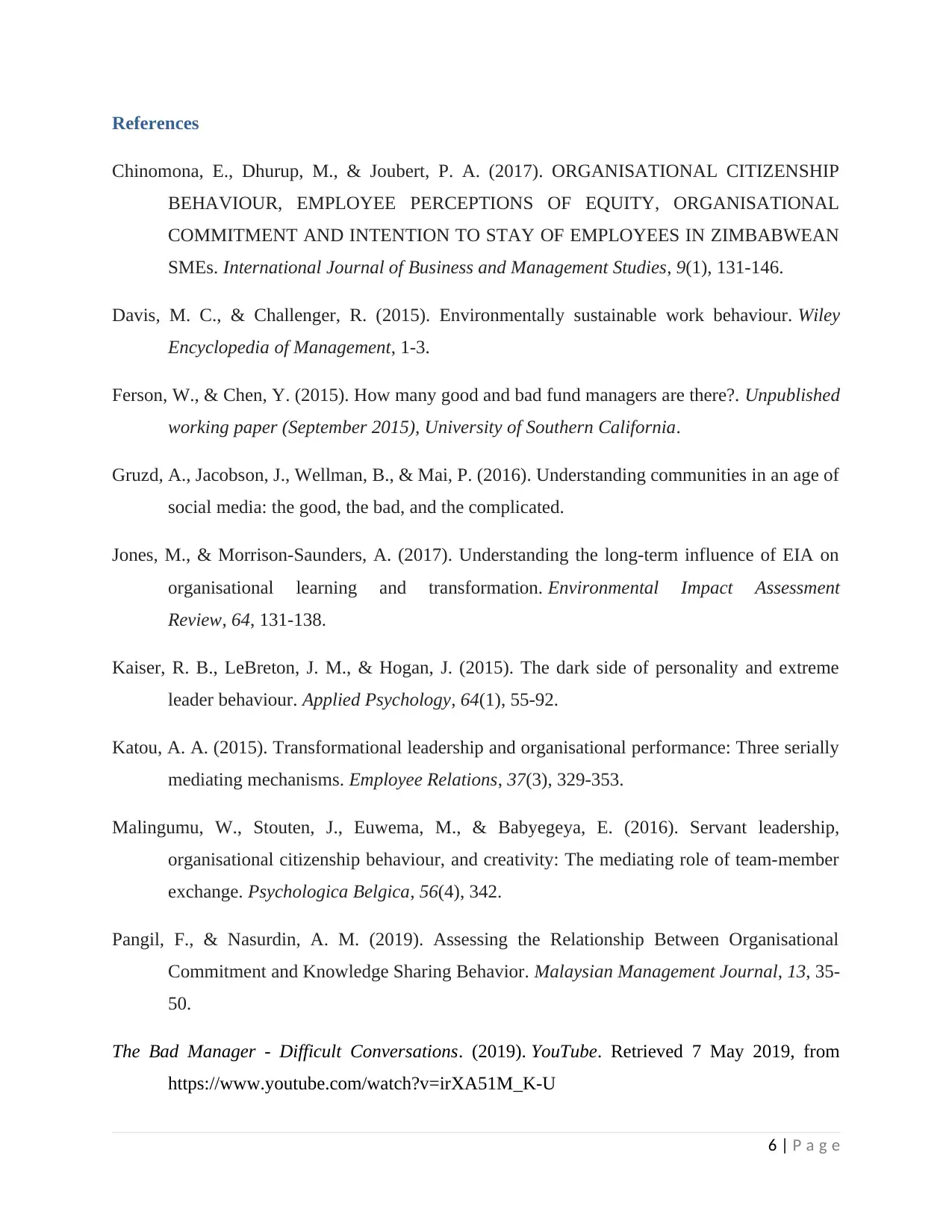
References
Chinomona, E., Dhurup, M., & Joubert, P. A. (2017). ORGANISATIONAL CITIZENSHIP
BEHAVIOUR, EMPLOYEE PERCEPTIONS OF EQUITY, ORGANISATIONAL
COMMITMENT AND INTENTION TO STAY OF EMPLOYEES IN ZIMBABWEAN
SMEs. International Journal of Business and Management Studies, 9(1), 131-146.
Davis, M. C., & Challenger, R. (2015). Environmentally sustainable work behaviour. Wiley
Encyclopedia of Management, 1-3.
Ferson, W., & Chen, Y. (2015). How many good and bad fund managers are there?. Unpublished
working paper (September 2015), University of Southern California.
Gruzd, A., Jacobson, J., Wellman, B., & Mai, P. (2016). Understanding communities in an age of
social media: the good, the bad, and the complicated.
Jones, M., & Morrison-Saunders, A. (2017). Understanding the long-term influence of EIA on
organisational learning and transformation. Environmental Impact Assessment
Review, 64, 131-138.
Kaiser, R. B., LeBreton, J. M., & Hogan, J. (2015). The dark side of personality and extreme
leader behaviour. Applied Psychology, 64(1), 55-92.
Katou, A. A. (2015). Transformational leadership and organisational performance: Three serially
mediating mechanisms. Employee Relations, 37(3), 329-353.
Malingumu, W., Stouten, J., Euwema, M., & Babyegeya, E. (2016). Servant leadership,
organisational citizenship behaviour, and creativity: The mediating role of team-member
exchange. Psychologica Belgica, 56(4), 342.
Pangil, F., & Nasurdin, A. M. (2019). Assessing the Relationship Between Organisational
Commitment and Knowledge Sharing Behavior. Malaysian Management Journal, 13, 35-
50.
The Bad Manager - Difficult Conversations. (2019). YouTube. Retrieved 7 May 2019, from
https://www.youtube.com/watch?v=irXA51M_K-U
6 | P a g e
Chinomona, E., Dhurup, M., & Joubert, P. A. (2017). ORGANISATIONAL CITIZENSHIP
BEHAVIOUR, EMPLOYEE PERCEPTIONS OF EQUITY, ORGANISATIONAL
COMMITMENT AND INTENTION TO STAY OF EMPLOYEES IN ZIMBABWEAN
SMEs. International Journal of Business and Management Studies, 9(1), 131-146.
Davis, M. C., & Challenger, R. (2015). Environmentally sustainable work behaviour. Wiley
Encyclopedia of Management, 1-3.
Ferson, W., & Chen, Y. (2015). How many good and bad fund managers are there?. Unpublished
working paper (September 2015), University of Southern California.
Gruzd, A., Jacobson, J., Wellman, B., & Mai, P. (2016). Understanding communities in an age of
social media: the good, the bad, and the complicated.
Jones, M., & Morrison-Saunders, A. (2017). Understanding the long-term influence of EIA on
organisational learning and transformation. Environmental Impact Assessment
Review, 64, 131-138.
Kaiser, R. B., LeBreton, J. M., & Hogan, J. (2015). The dark side of personality and extreme
leader behaviour. Applied Psychology, 64(1), 55-92.
Katou, A. A. (2015). Transformational leadership and organisational performance: Three serially
mediating mechanisms. Employee Relations, 37(3), 329-353.
Malingumu, W., Stouten, J., Euwema, M., & Babyegeya, E. (2016). Servant leadership,
organisational citizenship behaviour, and creativity: The mediating role of team-member
exchange. Psychologica Belgica, 56(4), 342.
Pangil, F., & Nasurdin, A. M. (2019). Assessing the Relationship Between Organisational
Commitment and Knowledge Sharing Behavior. Malaysian Management Journal, 13, 35-
50.
The Bad Manager - Difficult Conversations. (2019). YouTube. Retrieved 7 May 2019, from
https://www.youtube.com/watch?v=irXA51M_K-U
6 | P a g e
Paraphrase This Document
Need a fresh take? Get an instant paraphrase of this document with our AI Paraphraser
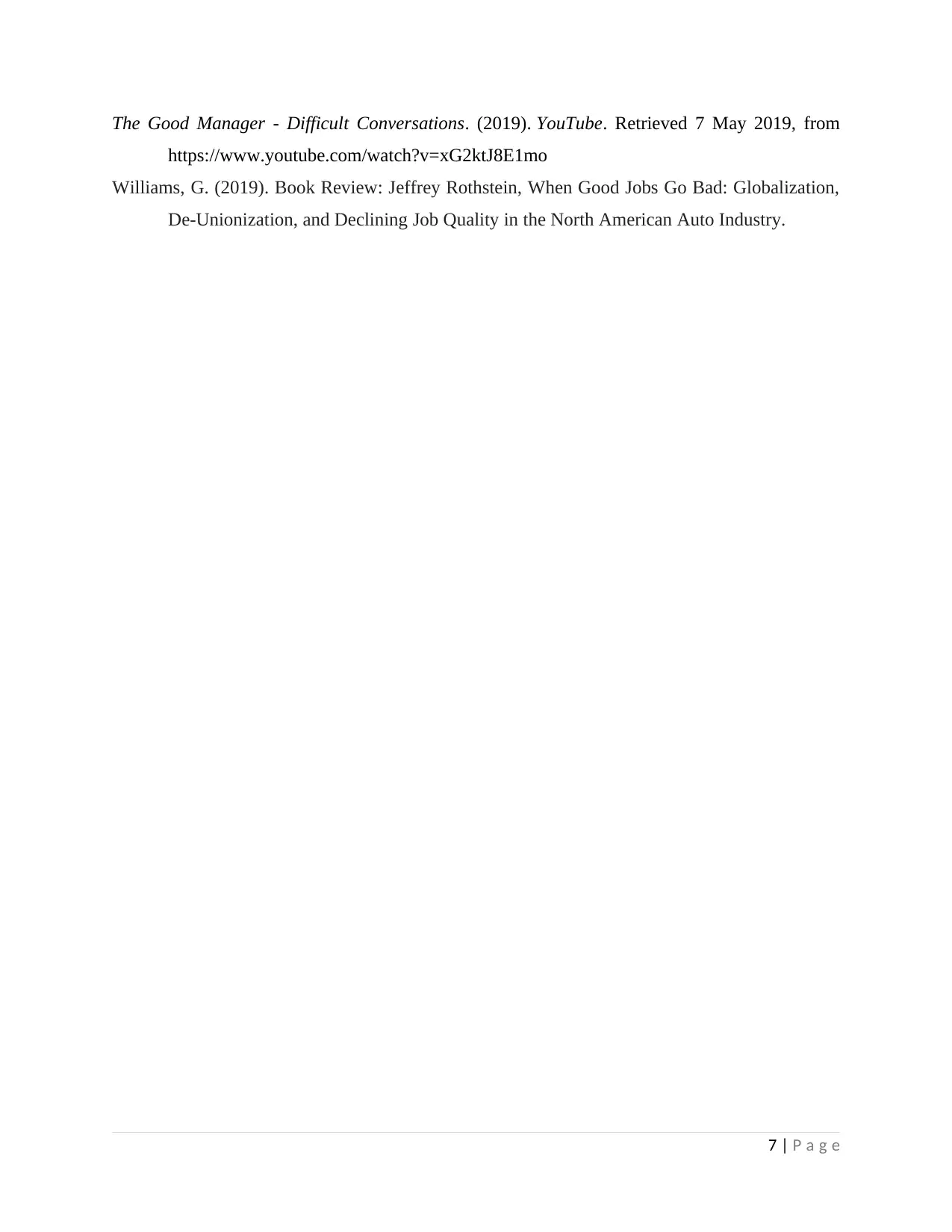
The Good Manager - Difficult Conversations. (2019). YouTube. Retrieved 7 May 2019, from
https://www.youtube.com/watch?v=xG2ktJ8E1mo
Williams, G. (2019). Book Review: Jeffrey Rothstein, When Good Jobs Go Bad: Globalization,
De-Unionization, and Declining Job Quality in the North American Auto Industry.
7 | P a g e
https://www.youtube.com/watch?v=xG2ktJ8E1mo
Williams, G. (2019). Book Review: Jeffrey Rothstein, When Good Jobs Go Bad: Globalization,
De-Unionization, and Declining Job Quality in the North American Auto Industry.
7 | P a g e
1 out of 8
Your All-in-One AI-Powered Toolkit for Academic Success.
+13062052269
info@desklib.com
Available 24*7 on WhatsApp / Email
![[object Object]](/_next/static/media/star-bottom.7253800d.svg)
Unlock your academic potential
© 2024 | Zucol Services PVT LTD | All rights reserved.





